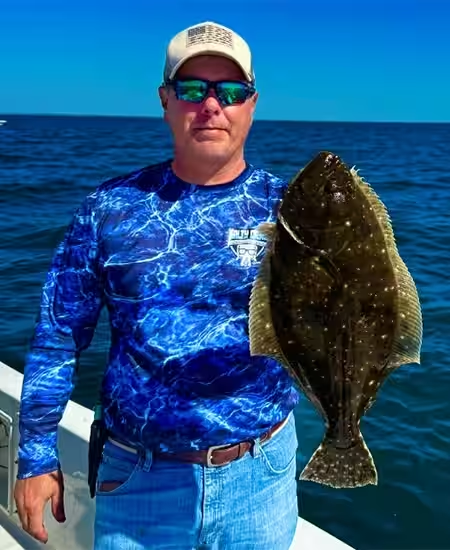What You Need to Know About Fishing Harvest Reporting

Big changes are coming for North Carolina anglers. Beginning December 1st 2025, the state will require everyone who keeps certain inshore fish — like red drum and speckled trout — to report their harvest. Whether you fish on your own or with a guide, here’s what you need to know to stay legal and help protect the future of our fisheries.
Starting December 1, 2025, all recreational anglers in North Carolina must report their harvest of certain inshore species to the N.C. Division of Marine Fisheries (DMF). This new statewide requirement aims to improve fisheries data accuracy and help biologists make better management decisions for some of our most popular game fish.
Who Must Report Their Catches?
If you fish recreationally in North Carolina’s Coastal, Joint, or Inland waters near the coast, you’re required to report any flounder, red drum, striped bass, spotted seatrout (speckled trout), or weakfish (gray trout) that you harvest and keep. This includes waters as far inland as Wake and Chatham counties.
The new rule applies to anglers fishing from shore, private boats, or with a licensed charter captain. In short, if you keep any of the listed species, you’re responsible for submitting your own harvest report.
How to Report Your Catch
Reports can be submitted online through the DMF’s webform or via a new smartphone app — available for iPhone users beginning in December (an Android version is on the way).
Commercial fishermen will continue to report sales through the Trip Ticket Program but must now report any finfish, shellfish, or crustaceans they keep for personal use.
Why Mandatory Harvest Reporting Matters

Accurate harvest data helps fisheries managers make informed decisions about seasons, size limits, and conservation measures. This system is designed to improve the balance between access for anglers and sustainability for fish populations. As a charter captain, I think this is a good move overall — especially if it helps ensure that the science guiding regulations for species like red drum and trout is based on the most complete data possible.
That said, the system will only be as strong as the accuracy of the information anglers provide. If people fail to report their harvests — or exaggerate what they caught — the data becomes unreliable. That can lead to overly restrictive seasons or bag limits that don’t reflect reality. On the other hand, underreporting could make a fishery appear healthier than it truly is. Both extremes hurt everyone who enjoys these waters. If anglers want fair, science-based regulations, we all need to take this seriously and report our catches honestly.
Captain’s Insight: “Anything that gives biologists more accurate data is a good thing. If reporting a few fish helps protect our seasons or keeps them open longer, it’s worth it. I’ll walk my charter guests through how to report whenever we bring fish home for dinner.”
How to Prepare Before December 1st 2025
- Bookmark the official DMF reporting webform on your phone.
- Watch for the iPhone app release and download it as soon as it’s available.
- Make sure you know whether you’re fishing in North Carolina or South Carolina waters before keeping a fish.
- Talk to your fishing partners and remind them that accurate reporting benefits everyone.
- If you fish with me on a Fishing Charter at Salty Dawg Fishing Charters, I’ll walk you through the process — but each guest will still need to submit their own report at the end of their fishing trip.
Where to Learn More
For more information, visit the N.C. Division of Marine Fisheries or the N.C. Wildlife Resources Commission.
You can also check the NCDMF Mandatory Harvest Reporting page for updates and detailed maps of reporting areas.
If you’re targeting redfish, trout, or flounder this season, you can read more about each species and local techniques on my North Carolina Saltwater Fishing Blog or my Ocean Isle Beach NC Fishing Reports page.
Source: North Carolina Division of Marine Fisheries & North Carolina Wildlife Resources Commission press release, October 2025.
Frequently Asked Questions
What species do I have to report in North Carolina?
Who has to report their catch?
When do I have to report my catch?
How do I submit my harvest report?
Do I have to report catch-and-release fish?
Will my charter captain report for me?
Can I report for my kids or family members?
What happens if I don’t report my harvest?
Will this app track my location or other data?

Tight Lines,
Captain Harvey Wall
Salty Dawg Fishing Charters
Updated: October 30, 2025